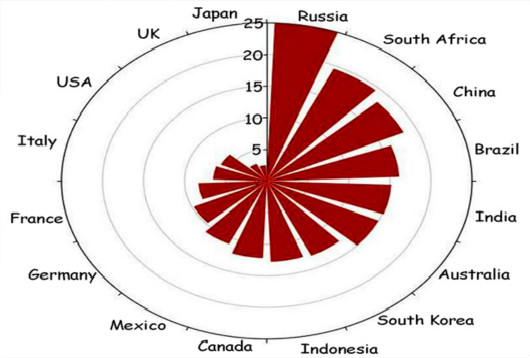
. > TOP STORIES
Digital economy flourishing in China
Author : Zhang Yixin Source : Chinese Social Sciences Today 2019-04-04

A pie chart of digital economy growth rates of some G20 members in 2017 by the China Academy of Information and Communications Technology
KUNMING—Scholars discussed the potential and challenges of China’s digital economy at a forum hosted by Yunnan University March 19–20.
Li Xiaohua, a research fellow from the Institute of Industrial Economics at the Chinese Academy of Social Sciences, said that China’s digital economy has gone through three phases of development: the phase of imitation (before 2001), the phase of growth (2002–2010), and the phase of elevation and innovation (2010 to date). At present, China’s digital economy is developing rapidly, with its economic aggregate ranking second in the world. The growth rate of the country’s digital economy is also one of the fastest in the world.
In the era of the digital economy, data will become a key factor of production driving China’s economic growth. Digital economic facilities will become new infrastructure, and digital literacy will become a new requirement for laborers and consumers, said Ding Wenfeng, a professor from the economics department at the Party School of the CPC Central Committee (National Academy of Governance), who added that the boundaries between social supply and demand will become increasingly blurred.
Ma Shuzhong, director of the China Academy of Cross-border E-Commerce at Zhejiang University, summed up the typical characteristics of China’s current digital trade: International cooperation is increasingly close, regional growth is seeing diverse highlights, trade structure is gradually improving, and re al-economy industries are accelerating integration.
Ding said that the digital economy requires the simultaneous planning, construction and management of digital cities and real cities, which will have a profound impact on the development of smart societies and smart cities, promoting the innovation and development of cities and society.
In Li’s view, the disruptive innovation of the digital economy has increased market opportunities for innovation and entrepreneurship, enabling enterprises to grow rapidly, form a network effect and increase leadership in the industry.
Lyu Xin, secretary general of the Time and Space Big Data Research Center at the State Information Center, said that it is time to establish big-data thinking, explore the value of big data, and promote the integration of the digital economy and real economy. It is necessary to develop small and medium-sized enterprises and value their role in the development of the digital economy.
Yang Yanlin, deputy director of the Institute of Strategic Management at Wuhan University, analyzed the problems facing the current development of China’s digital industry. He suggested conducting an analysis on the effects of the digital industry and improving the overall performance of the industry.
It is necessary to carry out research on the international competitiveness of the digital industry, Yang said. At the same time, relevant departments should analyze the effectiveness of laws, policies and regulations on the digital industry, adjusting and optimizing digital industry policy.
Yang continued that it is important to carry out policy research, cultivate the comparative advantages and competitiveness of regional digital industries, and avoid the blind development of local digital industries.
Yunnan Province has a unique location advantage, Li said. In the future, Yunnan should build a digital economic center that radiates across South and Southeast Asia.
In light of the new characteristics and trends of digital economic growth, Li said that Yunnan should seek breakthroughs in industry segments through subversive innovation, utilizing the province’s rich humanities and natural resources to develop augmented reality technology, virtual reality technology and the next-generation digital creative industry.
Ye Shengtao made Chinese fairy tales from a wilderness
Ye Shengtao (1894–1988) created the first collection of fairy tales in the history of Chinese children’s literature...
-
How northern ethnicities integrated into Chinese nation
2023-09-18
-
Mogao caves
2023-09-12
-
Mogao Grottoes as ‘a place of pilgrimage’
2023-09-12
-
Time-honored architectural traditions in China
2023-08-29
-
Disentangling the civilizational evolution of China
2023-08-28
-
AI ethics in science fiction
2023-08-23













 2011-2013 by www.cssn.cn. All Rights Reserved
2011-2013 by www.cssn.cn. All Rights Reserved